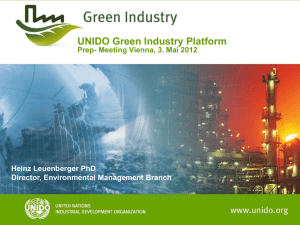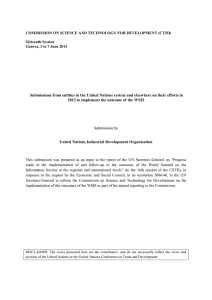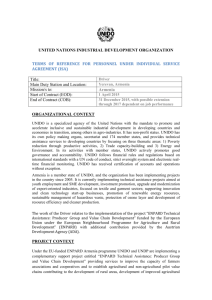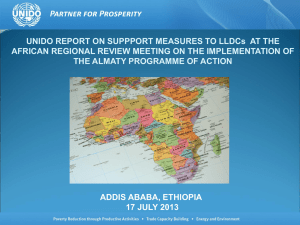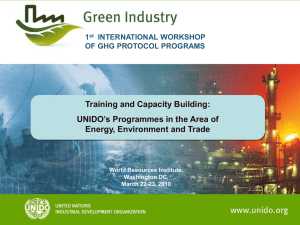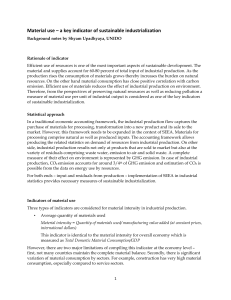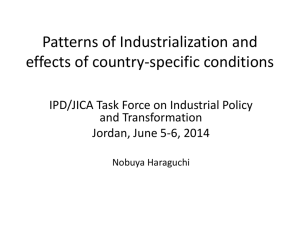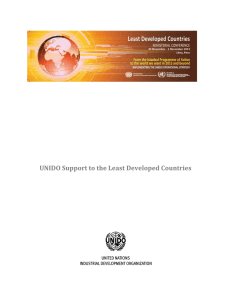6th LDC Ministerial Conference
advertisement
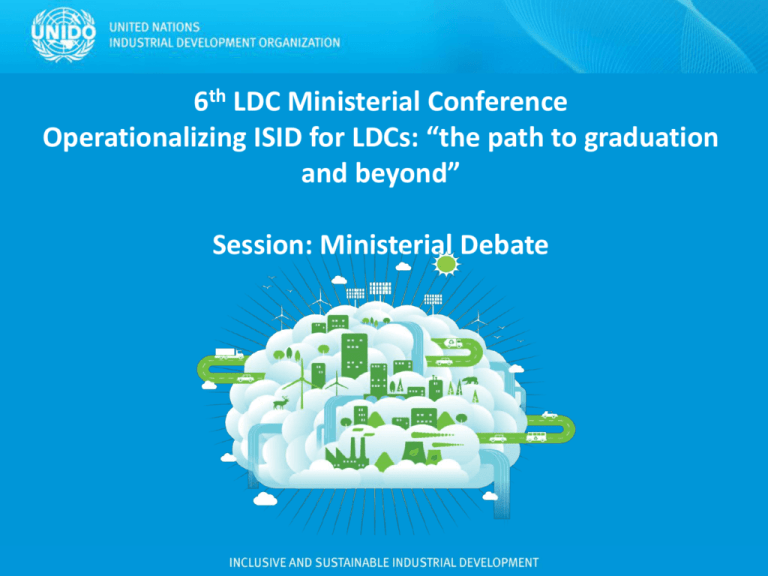
6th LDC Ministerial Conference Operationalizing ISID for LDCs: “the path to graduation and beyond” Session: Ministerial Debate Between 1971 - 2014 only 4 countries graduated out of the LDC category, namely: -Botswana : 19 December 1994 -Cape Verde: 20 December 2007 -Maldives and Samoa: 1 January 2011 Facts & Figures • • • • • LDCs population (2014): 898 million - 1/8 of the world’s total Combined exports 1.11% of worldwide exports GDP per capita: USD 802 (2012) 50.8% lives on < $1.25 per day LDC manufacturing share : 10% in 2013 compare to 21% Developing countries • Access to electricity : 35% of the population in 2013 Context • UNIDO’s organized five LDCs ministerial conferences since 2007 • Istanbul PoA was endorsed in June 2011, followed by UNIDO adoption of the LDC Operational Strategy 2012-2020 (Dec. 2011) • ISID adoption - 15th General Conference (Dec. 2013) – Lima Declaration Introduction of the UNIDO’s renewed mandate Inclusive and Sustainable Industrial Development (ISID) Goal: Harness the full potential of industry’s contribution to the achievement of sustainable development in the post 2015 era, directly participating to achieve the goals set by the IPoA. UNIDO’s strategy for LDC focus on three pillar: 1. Commodity conversion 2. Vulnerable communities 3. Regional value chain development UNIDO Technical Cooperation delivery in LDCs by Thematic Priorities 2012-2014 Between 2012 and 2014 UNIDO’s technical assistance towards LDCs reached a total of: EUR 173, 457,934.96 Poverty Reduction Trade Capacity Building Environment & Energy 85,103,600.03 35,076,433.12 53,277,901.81 30.7% 49.1% Poverty Reduction 20.22% Trade Capacity Building Energy and Environment 5 UNIDO’s Technical Assistance IPoA Priority areas Productive capacity Agriculture, food security and rural development Trade Commodities Human and social development Multiple crises and other emerging challenges Mobilizing financial resources for development and capacity-building Good governance at all levels Strengthening Agro Industries Value Chains and Supplier Development Clusters, export consortia and business linkages Competitiveness, upgrading and modernization Quality and compliance infrastructure Clusters, export consortia and business linkages Competitiveness, upgrading and modernization Productive work for young people and Entrepreneurship development Gender and Women’s empowerment/employment programmes Green Industry solutions; and Energy efficiency Water management Post-crises intervention-sustainable livelihood programmes Renewable and rural energy Cleaner and resource efficient production Investment and technology promotion Partnering with DFIs and other multilateral funding agencies (GEF, MP) Partnership development with the private sector (PPPs) Development of Programme for Country Partnership (PCPs) Industrial Policy advice Snapshots of UNIDO Technical Cooperation Activities UNIDO’s core areas of intervention in LDCs supporting structural transformation: Further Information to be found on the session background paper. (Chapter III – p.10) 7 Trade capacity building Ensuring quality and sustainability along the coffee value chain – Burundi: • Partners/Donors: NORAD and the EIF • Budget: USD 3,000,000 • Objective: improve Burundi’s competitiveness by facilitating local products access to regional and international markets through strengthening the country’s compliance capacity with Sanitary and Phytosanitary measures (SPS) Main achievements: • 80 inspectors trained • over 100 executives have been sensitized on standardization and regulation • 110 executives of processing units have been trained in quality and food safety Similar projects have been developed in Bangladesh, Laos, Myanmar, Uganda Income generating activities and communities empowerment Entrepreneurship Curriculum Programme (ECP) – Mozambique: • Partners/Donors: UNIDO, NORAD • Budget: USD 2, 700, 000 • Objective: Developing entrepreneurial aptitude and skills in secondary and vocational schools. Main Achievements: • ECP integrated in the formal National Education Strategy • Implemented in 331 schools & 1,654 teachers trained • 496,4000 students took the course, 127,800 have graduated (45% are female) The ECP Programme has been successfully developed in Angola, Rwanda, Uganda, Cabo Verde and is planned to be replicated in other regions Infrastructure development, renewable energy and environment: Reduction of GHG emission through promotion of commercial biogas plants Cambodia: • • • Partners/Donors: UNIDO, Foreign Trade Bank, Global Environment Facility Budget: USD 1,500,499 Objective: Develop financially viable, reliable, sustainable biogas-based mini-grid for rural electrification. Main Achievements: • Photovoltaic battery-charging stations installed in 6 remote villages providing energy to 1, 073 households • Solar dryer technology unit installed improving dried fish production of local businesses • 150Kw rice husk gasifier set up connecting 300 supplementary households while reducing CO2 emissions by 900 tons per year Similar projects have been developed in the DRC, Burundi, the Gambia, Chad Industrial capacity building, policy support and statistics: Industrial policy capacity building support programme - Tanzania: • Partners/Donors: UNIDO, Ministry of Industry and Trade of Tanzania, Planning Commission • Budget: USD 432, 962 • Objective: support in industrial policymaking schemes/strategies by providing tailored and timely advices, capacity building and facilitation services Main Achievements: • Two Industrial Intelligence Units set up to support government’s activities. • Capacity building and trainings provided to national statisticians • Two industrial competitiveness report published in 2013 and 2014. Similar projects have been developed in Burundi, Laos, Myanmar, Uganda The 6th UNIDO LDC Ministerial Conference • Defining moment in the history of development cooperation • Industrialization strongly featured in the new global agenda (SDG 9) • 6th LDC Ministerial Conference : key transition from the SDGs adoption to the IPoA mid-term review to be held in Antalya (2016) • A platform for Member States to embark on an open dialogue on how UNIDO can enhance its efficiency in terms of delivery and technical assistance in LDCs • UNIDO: LDCs priority target to fully operationalize ISID UNIDO chose two LDCs as pilot to implement its ISID mandate through the Programme for Country Partnership (PCP) approach : Ethiopia and Senegal Objectives of the Ministerial Debate • Provide invaluable inputs for the IPOA mid-term review (Antalya June 2016) • Explore how to further develop synergies between development and international organizations to achieve the goals set in 2020 (IPoA – UNIDO Operational Strategy) • Reaffirm that mainstreaming sustainable and inclusive industrialization within National and Regional policies is instrumental in the graduation process • Graduation should not be an end in itself but a stepping stone towards sound and sustainable structural transformation • Agree on “ISID for LDCs Operational Strategy” Thank you for your kind attention! For further information please access: www.unido.com/ldc2015
